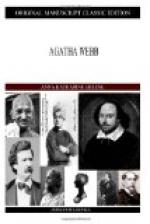“She should be under surveillance, though,” intimated the coroner.
“Most certainly,” acquiesced Knapp.
As for Sweetwater, he remained silent till the opportunity came for him to whisper apart to Dr. Talbot, when he said:
“For all the palpable proof of which Mr. Knapp speaks—the J. Z. on the dagger, and the possibility of this being the object he was seen carrying out of Philemon Webb’s gate—I maintain that this old man in his moribund condition never struck the blow that killed Agatha Webb. He hadn’t strength enough, even if his lifelong love for her had not been sufficient to prevent him.”
The coroner looked thoughtful.
“You are right,” said he; “he hadn’t strength enough. But don’t expend too much energy in talk. Wait and see what a few direct questions will elicit from Miss Page.”
XVIII
SOME LEADING QUESTIONS
Frederick rose early. He had slept but little. The words he had overheard at the end of the lot the night before were still ringing in his ears. Going down the back stairs, in his anxiety to avoid Amabel, he came upon one of the stablemen.
“Been to the village this morning?” he asked.
“No, sir, but Lem has. There’s great news there. I wonder if anyone has told Mr. Sutherland.”
“What news, Jake? I don’t think my father is up yet.”
“Why, sir, there were two more deaths in town last night—the brothers Zabel; and folks do say (Lem heard it a dozen times between the grocery and the fish market) that it was one of these old men who killed Mrs. Webb. The dagger has been found in their house, and most of the money. Why, sir, what’s the matter? Are you sick?”
Frederick made an effort and stood upright. He had nearly fallen.
“No; that is, I am not quite myself. So many horrors, Jake. What did they die of? You say they are both dead—both?”
“Yes, sir, and it’s dreadful to think of, but it was hunger, sir. Bread came too late. Both men are mere skeletons to look at. They have kept themselves close for weeks now, and nobody knew how bad off they were. I don’t wonder it upset you, sir. We all feel it a bit, and I just dread to tell Mr. Sutherland.”
Frederick staggered away. He had never in his life been so near mental and physical collapse. At the threshold of the sitting-room door he met his father. Mr. Sutherland was looking both troubled and anxious; more so, Frederick thought, than when he signed the check for him on the previous night. As their eyes met, both showed embarrassment, but Frederick, whose nerves had been highly strung by what he had just heard, soon controlled himself, and surveying his father with forced calmness, began:
“This is dreadful news, sir.”
But his father, intent on his own thought, hurriedly interrupted him.
“You told me yesterday that everything was broken off between you and Miss Page. Yet I saw you reenter the house together last night a little while after I gave you the money you asked for.”




